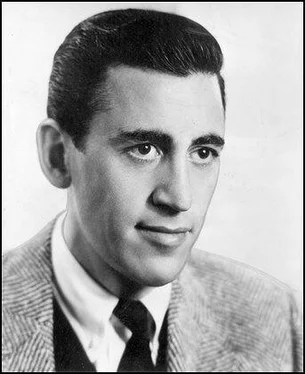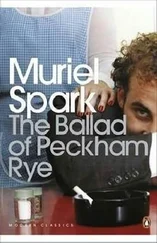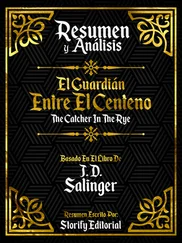While I was eating my eggs, these two nuns with suitcases and all—I guessed they were moving to another convent or something and were waiting for a train—came in and sat down next to me at the counter. They didn’t seem to know what the hell to do with their suitcases, so I gave them a hand. They were these very inexpensive-looking suitcases—the ones that aren’t genuine leather or anything. It isn’t important, I know, but I hate it when somebody has cheap suitcases. It sounds terrible to say it, but I can even get to hate somebody, just looking at them, if they have cheap suitcases with them. Something happened once. For a while when I was at Elkton Hills, I roomed with this boy, Dick Slagle, that had these very inexpensive suitcases. He used to keep them under the bed, instead of on the rack, so that nobody’d see them standing next to mine. It depressed holy hell out of me, and I kept wanting to throw mine out or something, or even trade with him. Mine came from Mark Cross, and they were genuine cowhide and all that crap, and I guess they cost quite a pretty penny. But it was a funny thing. Here’s what happened. What I did, I finally put my suitcases under my bed, instead of on the rack, so that old Slagle wouldn’t get a goddam inferiority complex about it. But here’s what he did. The day after I put mine under my bed, he took them out and put them back on the rack. The reason he did it, it took me a while to find out, was because he wanted people to think my bags were his. He really did. He was a very funny guy, that way. He was always saying snotty things about them, my suitcases, for instance. He kept saying they were too new and bourgeois. That was his favorite goddam word. He read it somewhere or heard it somewhere. Everything I had was bourgeois as hell. Even my fountain pen was bourgeois. He borrowed it off me all the time, but it was bourgeois anyway. We only roomed together about two months. Then we both asked to be moved. And the funny thing was, I sort of missed him after we moved, because he had a helluva good sense of humor and we had a lot of fun sometimes. I wouldn’t be surprised if he missed me, too. At first he only used to be kidding when he called my stuff bourgeois, and I didn’t give a damn—it was sort of funny, in fact. Then, after a while, you could tell he wasn’t kidding any more. The thing is, it’s really hard to be roommates with people if your suitcases are much better than theirs—if yours are really good ones and theirs aren’t. You think if they’re intelligent and all, the other person, and have a good sense of humor, that they don’t give a damn whose suitcases are better, but they do. They really do. It’s one of the reasons why I roomed with a stupid bastard like Stradlater. At least his suitcases were as good as mine.
Anyway, these two nuns were sitting next to me, and we sort of struck up a conversation. The one right next to me had one of those straw baskets that you see nuns and Salvation Army babes collecting dough with around Christmas time. You see them standing on corners, especially on Fifth Avenue, in front of the big department stores and all. Anyway, the one next to me dropped hers on the floor and I reached down and picked it up for her. I asked her if she was out collecting money for charity and all. She said no. She said she couldn’t get it in her suitcase when she was packing it and she was just carrying it. She had a pretty nice smile when she looked at you. She had a big nose, and she had on those glasses with sort of iron rims that aren’t too attractive, but she had a helluva kind face. “I thought if you were taking up a collection,” I told her, “I could make a small contribution. You could keep the money for when you do take up a collection.”
“Oh, how very kind of you,” she said, and the other one, her friend, looked over at me. The other one was reading a little black book while she drank her coffee. It looked like a Bible, but it was too skinny. It was a Bible-type book, though. All the two of them were eating for breakfast was toast and coffee. That depressed me. I hate it if I’m eating bacon and eggs or something and somebody else is only eating toast and coffee.
They let me give them ten bucks as a contribution. They kept asking me if I was sure I could afford it and all. I told them I had quite a bit of money with me, but they didn’t seem to believe me. They took it, though, finally. The both of them kept thanking me so much it was embarrassing. I swung the conversation around to general topics and asked them where they were going. They said they were schoolteachers and that they’d just come from Chicago and that they were going to start teaching at some convent on 168th Street or 186th Street or one of those streets way the hell uptown. The one next to me, with the iron glasses, said she taught English and her friend taught history and American government. Then I started wondering like a bastard what the one sitting next to me, that taught English, thought about, being a nun and all, when she read certain books for English. Books not necessarily with a lot of sexy stuff in them, but books with lovers and all in them. Take old Eustacia Vye, in The Return of the Native by Thomas Hardy. She wasn’t too sexy or anything, but even so you can’t help wondering what a nun maybe thinks about when she reads about old Eustacia. I didn’t say anything, though, naturally. All I said was English was my best subject.
“Oh, really? Oh, I’m so glad!” the one with the glasses, that taught English, said. “What have you read this year? I’d be very interested to know.” She was really nice.
“Well, most of the time we were on the Anglo-Saxons. Beowulf, and old Grendel, and Lord Randal My Son, and all those things. But we had to read outside books for extra credit once in a while. I read The Return of the Native by Thomas Hardy, and Romeo and Juliet and Julius—”
“Oh, Romeo and Juliet! Lovely! Didn’t you just love it?” She certainly didn’t sound much like a nun.
“Yes. I did. I liked it a lot. There were a few things I didn’t like about it, but it was quite moving, on the whole.”
“What didn’t you like about it? Can you remember?” To tell you the truth, it was sort of embarrassing, in a way, to be talking about Romeo and Juliet with her. I mean that play gets pretty sexy in some parts, and she was a nun and all, but she asked me, so I discussed it with her for a while. “Well, I’m not too crazy about Romeo and Juliet,” I said. “I mean I like them, but—I don’t know. They get pretty annoying sometimes. I mean I felt much sorrier when old Mercutio got killed than when Romeo and Juliet did. The think is, I never liked Romeo too much after Mercutio gets stabbed by that other man—Juliet’s cousin—what’s his name?”
“Tybalt.”
“That’s right. Tybalt,” I said—I always forget that guy’s name. “It was Romeo’s fault. I mean I liked him the best in the play, old Mercutio. I don’t know. All those Montagues and Capulets, they’re all right—especially Juliet—but Mercutio, he was—it’s hard to explain. He was very smart and entertaining and all. The thing is, it drives me crazy if somebody gets killed— especially somebody very smart and entertaining and all—and it’s somebody else’s fault. Romeo and Juliet, at least it was their own fault.”
“What school do you go to?” she asked me. She probably wanted to get off the subject of Romeo and Juliet.
I told her Pencey, and she’d heard of it. She said it was a very good school. I let it pass, though. Then the other one, the one that taught history and government, said they’d better be running along. I took their check off them, but they wouldn’t let me pay it. The one with the glasses made me give it back to her.
“You’ve been more than generous,” she said. “You’re a very sweet boy.” She certainly was nice. She reminded me a little bit of old Ernest Morrow’s mother, the one I met on the train. When she smiled, mostly. “We’ve enjoyed talking to you so much,” she said.
Читать дальше











